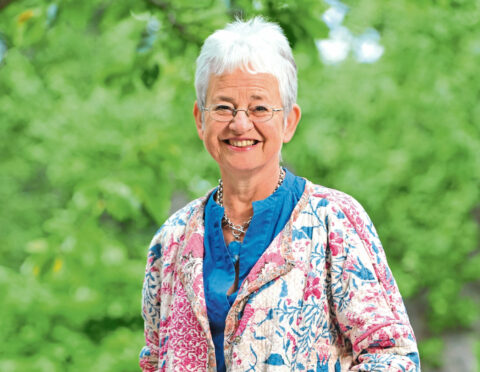
She’s the former Children’s Laureate who began her writing career in Scotland with Jackie magazine.
Tracy Beaker creator Jacqueline Wilson – who has since become a Dame – has written more than 100 books and sold more than 40 million of them – usually tackles the toughest of subjects in her titles for kids and young adults, from bullying to divorce and broken families, and even sexuality.
When she last spoke to P.S in 2020, while the pandemic raged, she chatted about her first same-sex love story, Love Frankie, after publicly coming out herself. This time round she tells us the pandemic has made her more prolific than ever, with more books written and new TV projects in the pipeline. Most of all it has helped her to realise a dream of writing a re-imagining of Enid Blyton’s The Magic Faraway Tree, her personal favourite in childhood.
She says: “During the two years when I wasn’t able to go out and about, I’ve become like a hamster in a cage, writing more than ever.”
Wilson’s The Magic Faraway Tree: A New Adventure, takes Blyton’s storyline about three children who discover enchanted lands at the top of an enormous tree and gives it a modern twist.
She says “everything is similar” to Blyton’s original, first published more than seven decades ago, “but my children are modern children.” Wilson, 76, adds: “They are 2020 children, with their own ideas and thoughts but enjoy magical adventures just as much as anyone else.”
The book introduces Milo, Mia and Birdy in a contemporary way, with parents keeping a watchful eye in the background, whereas the original saw no parental supervision as the norm.
Wilson, who lives with her long-term partner Trish in Sussex, believes it’s hugely important to keep classics on the bookshelves.
“Children should read a wide variety of stories, but some classics should last generation after generation. I’m a huge Charlotte Bronte fan, a Dickens fan, although I’m not comparing myself to these giants, but I think it’s worth keeping some favourite books in print because they have stood up for themselves and delighted many generations.”
Of her reworking of the Blyton classic she says: “I’m very respectful of the original but over many decades, occasionally food references or unfortunate references that were ordinary in their times but nowadays don’t fit with the way we think have gently been changed.”
But it’s all done with a light touch, she says.“I wouldn’t dream of changing the characters of Enid Blyton’s beloved people, because I would imagine a lot of older people like me who grew up with these books don’t want things to change. You have to be careful, you have to be inclusive. I have the Land of Princes and Princesses – and you couldn’t get more stereotypical there – but I have tried to have the children respond in the way I think they would.
“Milo is interested in this medieval fairytale world, but doesn’t like the thoughts of dancing. Birdy, his sister, prances around in her princess dress and tiara, whereas Mia prefers to look at the jousting and go to the yard where the horses are kept. They are true to themselves. Any child reading the story can identify with one or the other or all of the reactions.”
And it was important for her to create a happy escape from the stark realities of our world today. She explained: “This is the way of children’s literature, that Covid doesn’t exist, frightening wars don’t exist, it’s a book set during the summer holidays and I want it to be a kind of holiday for all of us. And it’s a holiday for me too, because as you know, I tend to write about children going through tough times, although there are funny times too.”
Jacqueline Wilson The Magic Faraway Tree: A New Adventure, Hodder Children’s Books, £12.99

Enjoy the convenience of having The Sunday Post delivered as a digital ePaper straight to your smartphone, tablet or computer.
Subscribe for only £5.49 a month and enjoy all the benefits of the printed paper as a digital replica.
Subscribe